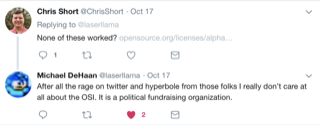The crusade against open-source abuse
There’s a dark cloud on the horizon. The behavior of cloud infrastructure providers, such as Amazon, threatens the viability of open source. I first wrote about this problem in a prior piece on TechCrunch. In 2018, thankfully, several leaders have mobilized (amid controversy) to propose multiple solutions to the problem. Here’s what’s happened in the last month.
The Problem
Go to Amazon Web Services (AWS) and hover over the Products menu at the top. You will see numerous open-source projects that Amazon did not create, but run as-a-service. These provide Amazon with billions of dollars of revenue per year. To be clear, this is not illegal. But it is not conducive to sustainable open-source communities, and especially commercial open-source innovation.
Two Solutions
In early 2018, I gathered together the creators, CEOs or general counsels of two dozen at-scale open-source companies, along with respected open-source lawyer Heather Meeker, to talk about what to do.
We wished to define a license that prevents cloud infrastructure providers from running certain software as a commercial service, while at the same time making that software effectively open source for everyone else, i.e. everyone not running that software as a commercial service.
With our first proposal, Commons Clause, we took the most straightforward approach: we constructed one clause, which can be added to any liberal open-source license, preventing the licensee from “Selling” the software — where “Selling” includes running it as a commercial service. (Selling other software made with Commons Clause software is allowed, of course.) Applying Commons Clause transitions a project from open source to source-available.
We also love the proposal being spearheaded by another participant, MongoDB, called the Server Side Public License (SSPL). Rather than prohibit the software from being run as a service, SSPL requires that you open-source all programs that you use to make the software available as a service, including, without limitation, management software, user interfaces, application program interfaces, automation software, monitoring software, backup software, storage software and hosting software, all such that a user could run an instance of the service. This is known as a “copyleft.”
These two licenses are two different solutions to exactly the same problem. Heather Meeker wrote both solutions, supported by feedback organized by FOSSA.
The initial uproar and accusations that these efforts were trying to “trick” the community fortunately gave way to understanding and acknowledgement from the open-source community that there is a real problem to be solved here, that it is time for the open-source community to get real and that it is time for the net giants to pay fairly for the open source on which they depend.
In October, one of the board members of the Apache Software Foundation (ASF) reached out to me and suggested working together to create a modern open-source license that solves the industry’s needs.
Kudos to MongoDB
Further kudos are owed to MondoDB for definitively stating that they will be using SSPL, submitting SSPL in parallel to an organization called Open Source Initiative (OSI) for endorsement as an open-source license, but not waiting for OSI’s endorsement to start releasing software under the SSPL.
OSI, which has somehow anointed itself as the body that will “decide” whether a license is open source, has a habit of myopically debating what’s open source and what’s not. With the submission of SSPL to OSI, MongoDB has put the ball in OSI’s court to either step up and help solve an industry problem, or put their heads back in the sand.
In fact, MongoDB has done OSI a huge favor. MongoDB has gone and solved the problem and handed a perfectly serviceable open-source license to OSI on a silver platter.
Open-source sausage
The public archives of OSI’s debate over SSPL are at times informative and at times amusing, bordering on comical. After MongoDB’s original submission, there were rah-rah rally cries amongst the members to find reasons to deem SSPL not an open-source license, followed by some +1’s. Member John Cowan reminded the group that just because OSI does not endorse a license as open source, does not mean that it is not open source:
As far as I know (which is pretty far), the OSI doesn’t do that. They have never publicly said “License X is not open source.” People on various mailing lists have done so, but not the OSI as such. And they certainly don’t say “Any license not on our OSI Certified ™ list is not open source”, because that would be false. It’s easy to write a license that is obviously open source that the OSI would never certify for any of a variety of reasons.
Eliot Horowitz (CTO and co-founder of MongoDB) responded cogently to questions, comments and objections, concluding with:
In short, we believe that in today’s world, linking has been superseded by the provision of programs as services and the connection of programs over networks as the main form of program combination. It is unclear whether existing copyleft licenses clearly apply to this form of program combination, and we intend the SSPL to be an option for developers to address this uncertainty.
Much discussion ensued about the purpose, role and relevance of OSI. Various sundry legal issues were raised or addressed by Van Lindberg, McCoy Smith and Bruce Perens.
Heather Meeker (the lawyer who drafted both Commons Clause and SSPL) stepped in and completely addressed the legal issues that had been raised thus far. Various other clarifications were made by Eliot Horowitz, and he also conveyed willingness to change the wording of the license if it would help.
Discussion amongst the members continued about the role, relevance and purpose of OSI, with one member astutely noting that there were a lot of “free software” wonks in the group, attempting to bastardize open source to advocate their own agenda:
If, instead, OSI has decided that they are now a Free Software organization, and that Free Software is what “we” do, and that “our” focus is on “Free software” then, then let’s change the name to the Free Software Initiative and open the gates for some other entity, who is all about Open Source, to take on that job, and do it proudly. :-)
There was debate over whether SSPL discriminates against types of users, which would disqualify it from being open source. Eliot Horowitz provided a convincing explanation that it did not, which seemed to quiet the crowd.
Heather Meeker dropped some more legal knowledge on the group, which seemed to sufficiently address outstanding issues. Bruce Perens, the author of item 6 of the so-called open-source definition, acknowledged that SSPL does not violate item 6 or item 9 of the definition, and subsequently suggested revising item 9 such that SSPL would violate it:
We’re not falling on our swords because of this. And we can fix OSD #9 with a two word addition “or performed” as soon as the board can meet. But it’s annoying.
Kyle Mitchell, himself an accomplished open-source lawyer, opposed such a tactic. Larry Rosen pointed out that some members’ assertion (that “it is fundamental to open source that everyone can use a program for any purpose”) is untrue. Still more entertaining discussion ensued about the purpose of OSI and the meaning of open source.
Carlos Piana succinctly stated why SSPL was indeed open source. Kyle Mitchell added that if licenses were to be judged in the manner that the group was judging SSPL, then GPL v2 was not open source either.
Groundswell
Meanwhile Dor Lior, the founder of database company ScyllaDB, compared SSPL and AGPL side-to-side and argued that “MongoDB would have been better off with Commons Clause or just swallowed a hard pill and stayed with APGL.” Player.FM released their service based on Commons Clause-licensed RediSearch, after in-memory database company Redis Labs placed RediSearch and four other specific add-on modules (but not Redis itself) under Commons Clause, and graph database company Neo4J placed its entire codebase under Commons Clause and raised an $80 million Series E.
Then Michael DeHaan, creator of Red Hat Ansible, chose Commons Clause for his new project. When asked why he did not choose any of the existing licenses that OSI has “endorsed” to be open source, he said:

This groundswell in 2018 should be ample indication that there is an industry problem that needs to be fixed.
Eliot Horowitz summarized and addressed all the issues, dropped the mic and left for a while. When it seemed like SSPL was indeed following all the rules of open-source licenses, and was garnering support of the members, Brad Kuhn put forward a clumsy argument for why OSI should change the rules as necessary to prevent SSPL from being deemed open source, concluding:
It’s likely the entire “license evaluation process” that we use is inherently flawed.
Mitchell clinched the argument that SSPL is open source with definitive points. Horowitz thanked the members for their comments and offered to address any concerns in a revision, and returned a few days later with a revised SSPL.
OSI has 60 days since MongoDB’s new submission to make a choice:
- Wake up and realize that SSPL, perhaps with some edits, is indeed an open-source license, OR
- Effectively signal to the world that OSI does not wish to help solve the industry’s problems, and that they’d rather be policy wonks and have theoretical debates.
“Wonk” here is meant in the best possible way.

Importantly, MongoDB is proceeding to use the SSPL regardless. If MongoDB were going to wait until OSI’s decision, or if OSI were more relevant, we might wait with bated breath to hear whether OSI would endorse SSPL as an open-source license.
As it stands, OSI’s decision is more important to OSI itself than to the industry. It signals whether OSI wants to remain relevant and help solve industry problems or whether it has become too myopic to be useful. Fearful of the latter, we looked to other groups for leadership and engaged with the Apache Software Foundation (ASF) when they reached out in the hopes of creating a modern open-source license that solves the industry’s needs.
OSI should realize that while it would be nice if they deemed SSPL to be open source, it is not critical. Again in the words of John Cowan, just because OSI has not endorsed a license as open source, does not mean it’s not open source. While we greatly respect almost all members of industry associations and the work they do in their fields, it is becoming difficult to respect the purpose and process of any group that anoints itself as the body that will “decide” whether a license is open source — it is arbitrary and obsolete.
Errata
In my zest to urge the industry to solve this problem, in an earlier piece, I had said that “if one takes open source software that someone else has built and offers it verbatim as a commercial service for one’s own profit” (as cloud infrastructure providers do) that’s “not in the spirit” of open source. That’s an overstatement and thus, frankly, incorrect. Open source policy wonks pointed this out. I obviously don’t mind rattling their cages but I should have stayed away from making statements about “what’s in the spirit” so as to not detract from my main argument.
Conclusion
The behavior of cloud infrastructure providers poses an existential threat to open source. Cloud infrastructure providers are not evil. Current open-source licenses allow them to take open-source software verbatim and offer it as a commercial service without giving back to the open-source projects or their commercial shepherds. The problem is that developers do not have open-source licensing alternatives that prevent cloud infrastructure providers from doing so. Open-source standards groups should help, rather than get in the way. We must ensure that authors of open-source software can not only survive, but thrive. And if that means taking a stronger stance against cloud infrastructure providers, then authors should have licenses available to allow for that. The open-source community should make this an urgent priority.
Disclosures
I have not invested directly or indirectly in MongoDB. I have invested directly or indirectly in the companies behind the open source projects Spring, Mule, DynaTrace, Ruby Rails, Groovy Grails, Maven, Gradle, Chef, Redis, SysDig, Prometheus, Hazelcast, Akka, Scala, Cassandra, Spinnaker, FOSSA, and… in Amazon.
Read more
November 29, 2018 at 07:30AM
from TechCrunch
via IFTTT




No comments